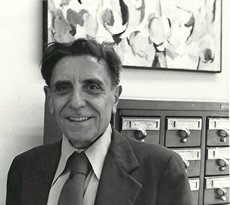Albert Edrei
Biography

Albert Edrei was born in Alexandria, Egypt on November 26, 1914, and he entered the Swiss Federal Institute of Technology in 1932, aiming for engineering. He transferred to mathematics and physics, and completed his doctorate in 1940. His doctoral dissertation centered on a problem suggested by Pólya, his advisor. During the war Albert served in the French army, from 1945 to 1949 he was lecturer at Farouk University in Egypt, and from 1949 to 1952 he was first at Saskatchwan and then at Colorado. He joined the SU faculty in 1952, was promoted to professor in 1956, and became distinguished professor in 1971. He was a visiting professor at the Imperial College in London in 1963 and 1968, and he directed the following Ph.D. dissertations, all but two at SU: Harvey McKenzie (1954) and Arnold Grudin (1960) (both at the University of Colorado at Boulder), James Snover (1955), Simon Hellerstein (1961), Daniel Shea (1965), Ki-Choul Oum (1967), Alan Weitsman (1968), Herbert Silverman (1968), Walter Pugh (1969), Said Abu-Zahra (1970), Shantilah Shah (1972), Nabil Boulos (1974), Faruk Fuad Abi-Khuzam (1975), Gary Federici (1977), and Tsegay Moges (1979).
He published 63 papers in entire and meromorphic functions, as well as on the Pade Table, 37 of them in a twenty-year collaboration with Wolfgang H. J. Fuchs of Cornell. In fact, the journal Complex Variables: Theory and Application, Volume 12 (October 1989) published by Gordon and Breach, constitutes the proceedings of a conference in honor of Edrei and Fuchs, co-edited by Karl Barth and Daniel Shea. Edrei's research was supported in part by 30 years of consecutive grants from the National Science Foundation and the Air Force, and one of his most important publications was his proof of I. J. Schoenberg's work on the generating functions of totally positive sequences. In 1985, the year he retired from SU, he was honored with a Chancellor's citation, and he spent the next year as a distinguished visitor at San Diego State. He moved to Princeton in 1988, and spent 1988-89 at the Institute for Advanced Study. He died in Princeton at 83 on April 29, 1998.
Lydia de Botton, whom he married in 1950, and four daughters survive him. In the cited Conference Proceedings Albert "emphatically state[d] that his mathematical work was made possible through the inspiration, understanding, patience and devotion of Lydia."
Sources: Professor Edrei's curriculum vita; the Mathematics Genealogy Project web site; Complex Variables: Theory and Application, volume 12, published by Gordon and Breach, 1989; and a short notice of his death in the Princeton Packet of May 5, 1998.
Phil Church 5/31/02
Last updated on 5/22/03
